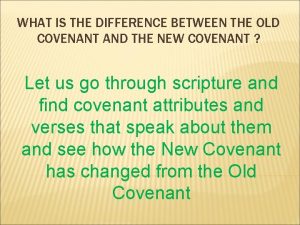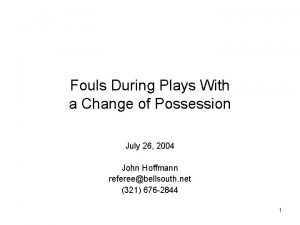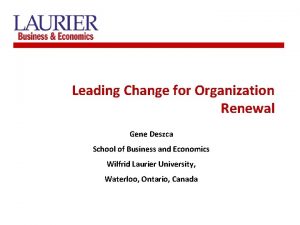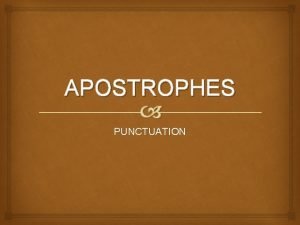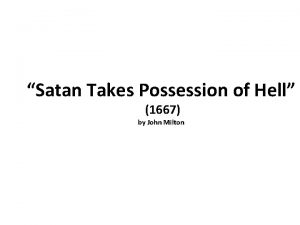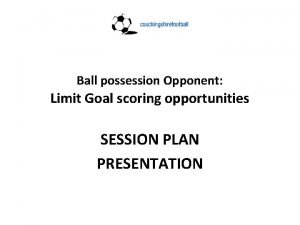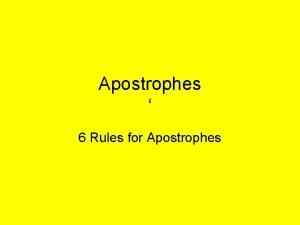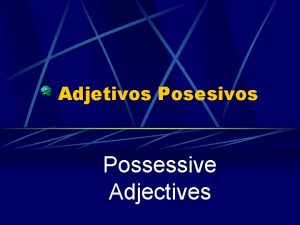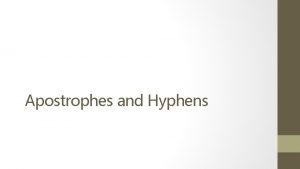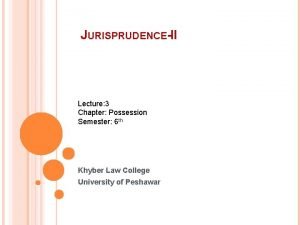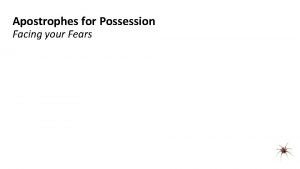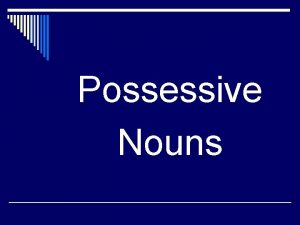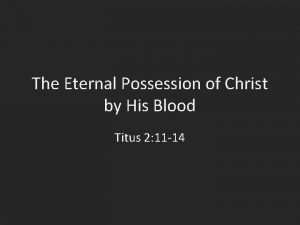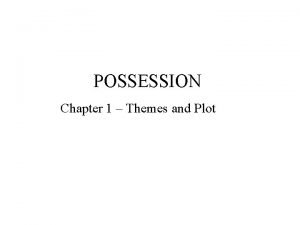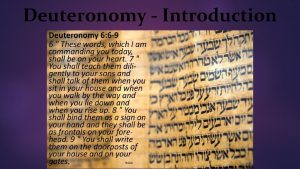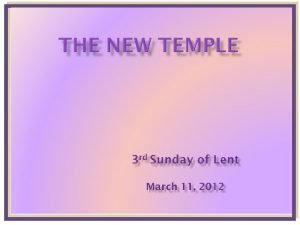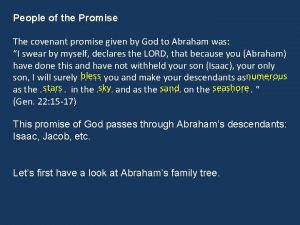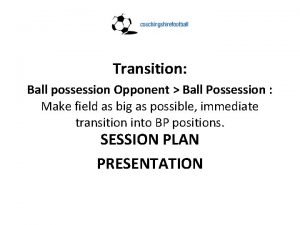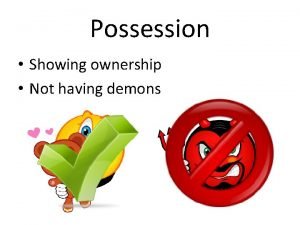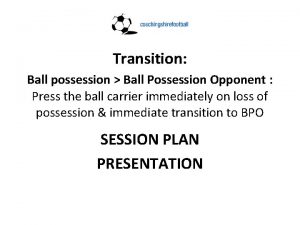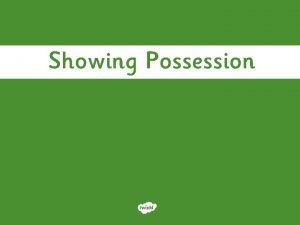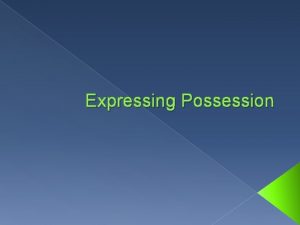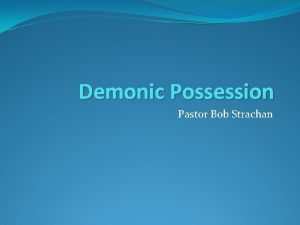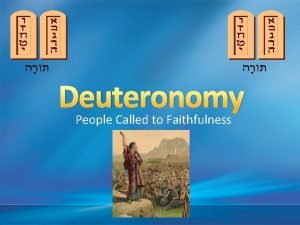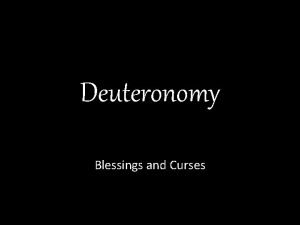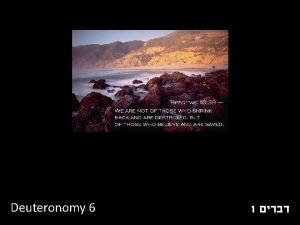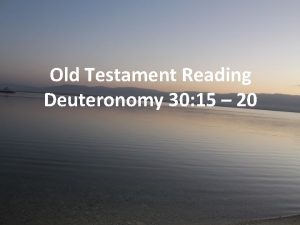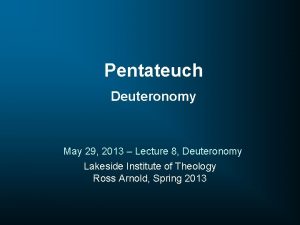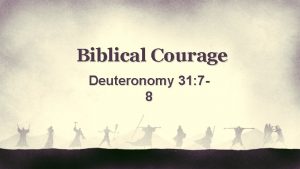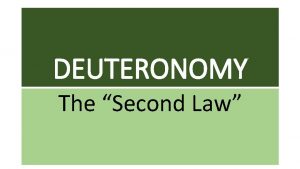Deuteronomy Covenant Renewal Facing Change u Promise Possession
























- Slides: 24

Deuteronomy: Covenant Renewal

Facing Change: u Promise Possession u Testing Resting u Transientness Permanence u Space Place

Is where you dwell important? u Does the “where” question effect behavior and destiny?

Land Concept u Not Merit Dt. 9: 5 u Not Effort Dt. 6: 10 -11 u Promised Land: Dt. 6: 10 u Promise --> fathers; u Possession --> descendants u Participating in a tradition

Land Concept (cont. ) u Land as Gift: Dt. 6: 10 -11 u God’s choosing, loving and making them special Dt. 7: 7 f u Good land – Flowing with milk and honey: Dt. 6: 3 – Filled land: Dt. 8: 7 -10 – Satisfying land Dt. 8: 10 -12 u Land of God’s presence: Deut 12: 5

Major Problems: u Forgetting where you came from: Deut 8: 10 f u On remembering: – House of bondage Dt 5: 6; 6: 12 – Remember you were slaves Dt 15: 15 – Remember God’s deliverance with a mighty hand out stretched arm (Dt 4: 39) u Remembering 8: 10 f) as basis of praise (Deut

Reflection Question u Where do you dwell? u Do you remember? (Praise. . . ? ) u How do you experience the presence of God in the where of which you live?

Moses and Deuteronomy Deut. as covenant renewal u JEDP theory again: u – J = Jehovah document (850 BC) – E = Elohim document (750 BC) – D = Deuteronomy (620 BC) – P = Priestly writer (450 BC) u Josiah finds (writes? ) the book of the law (2 Chr 34: 33)

Hittite Treaties (1200 BC) u Preamble (title) u Historical Prologue u Stipulations u Witnesses u Blessings and cursings

Assyrian Treaties (700 BC)

Assyrian Treaties (700 BC) Hittite Preamble (title) X u Historical Prologue X u Stipulations X u Witnesses X u Blessings X u Cursings X loyalty/trust u Assyrian X 0 X fear

Deuteronomy & Treaty Form u Preamble: Deut 1: 1 -5 u Historical Prologue: 1: 6 -3: 29 u Stipulations (Dt 4: 1 -11: 32) – General (Dt 4: 1 -11: 32) – Specific (Dt 12 -26) u Witnesses (Dt 27: 2 -4) u Curses and Blessings (Dt 28)

General Stipulations u The Ten Words (Deut 5) – BIG LC SPAMS u Shema (Deut 6: 4)

Specific Stipulations: Institutions in Israel u Prophets (Deut 13: 1 ff; 18: 17 ff) u Judges (Deut 16: 18) – Cities of Refuge (Deut 19: 2) u Kings (Deut 17: 14 -19)—like the nations – Not to --– To do -u Priests & Levites: no land (Deut 18: 2 f)

How do you go from “then” to “now” u On women wearing pants: Deut 22: 5 u Principle of differentiation u Real issue u Does culture impact God’s law? – Cf. king laws Deut 17: 16 f

Christ’s view of law u Not come to destroy it (Matt 5: 17 f) u Uses it to defend himself against Satan (Matt 4) u Greatest command (Matt 22: 37 f) u Permanence of law (Lk 16: 17) u Separation from Pharisaic misinterpretation of the law (you have heard it said, but I say. . . )

Paul’s view of law u Is Paul opposed to the law? (Gal 5: 4) u Condemnatory nature of law (Gal. 3: 10 f) u Never justified by law (Gal 2: 16; Rom 4: 3) u Holy and good (Rom 7: 12) u Pedagogical function: Gal 3: 24 to bring us to Christ

What still stands u Civil, ceremonial and moral division (? ) u Universal Principles: care for poor – Love God, be holy u Cultural re-particularization: no Baal, sacrifices, clean/unclean, altars built u Key: Underlying principle u Sermon on Mount as model: into the heart u Accommodation: Hardness of your heart: Mat 19: 8, u Canonical continuity or clashing (e. g. dietary laws; Acts 15)

Is law good or bad? Bad if. . . u Legalism u Security in performance u Externalization of religion u Condemnatory of others u Pride u Earning salvation

Is grace good or bad? Bad if. . . u Leads to license u Can do anything and I’ll be forgiven u Devaluing of sin u Entitlement – I deserve it

Laws that rattle our bones u War laws: – Building home exemption: Dt 20: 4 ff – Marriage exemption Dt 20: 7 – Give peace a chance Dt 20: 10 – Herem? Dt 20: 17 f; 7: 2 Complete destruction – Yet plunder (20: 14) of non-combatants 7: 3 how to intermarry if completely destroyed

Laws that rattle our bones (cont) u Rape laws (Deut 22: 23 ff)—city/field u Death penalty – False prophet (Dt 13: 10 f) – Idolater (Dt 18: 2 f) – Rebellious son (Dt 21: 18 f) – Non-virgin that marries (Dt 22: 20 f)? u Law as values signal not just moral/ legal code

Laws that rattle our bones (cont) u Dismemberment punishments: Deut 25: 11 -12 u Polygamy laws? (Deut 21: 15) u Slavery laws? (Deut 15: 12 ff) u Animal treatment laws (Deut 22: 10; 25: 4)

Law and Culture: Final Questions u The church is not Israel (nation): u What are the differences? u Underlying principle is key u What is the relationship to culture and the expression of the law? –Mat. 19: 8, u Law as a values signal u Israel is not America (prisons…) u Canonical context: continuity (love God/neighbor) and discontinuity (Acts 15)
 Difference between old covenant and new covenant
Difference between old covenant and new covenant Change of possession: *
Change of possession: * Leading change and organizational renewal
Leading change and organizational renewal Leading change and organizational renewal
Leading change and organizational renewal Place utility marketing
Place utility marketing Apostrophe exercises
Apostrophe exercises Place utility examples
Place utility examples Satan takes possession of hell
Satan takes possession of hell Utility and usefulness
Utility and usefulness Time utility examples
Time utility examples Apa itu ball possession
Apa itu ball possession Apostrophe possession rules
Apostrophe possession rules Possession spelling
Possession spelling Showing possession
Showing possession Show possession
Show possession Constructive possession
Constructive possession Use an apostrophe to show possession the song of the bird
Use an apostrophe to show possession the song of the bird Medication possession ratio calculation
Medication possession ratio calculation Prepositions of measure
Prepositions of measure Possession: a romance
Possession: a romance What spanish word is used to show ownership or possession
What spanish word is used to show ownership or possession Apostrophe before or after s
Apostrophe before or after s The possession of the christ
The possession of the christ Mi mis su sus tu tus
Mi mis su sus tu tus Possession chapter 1
Possession chapter 1
